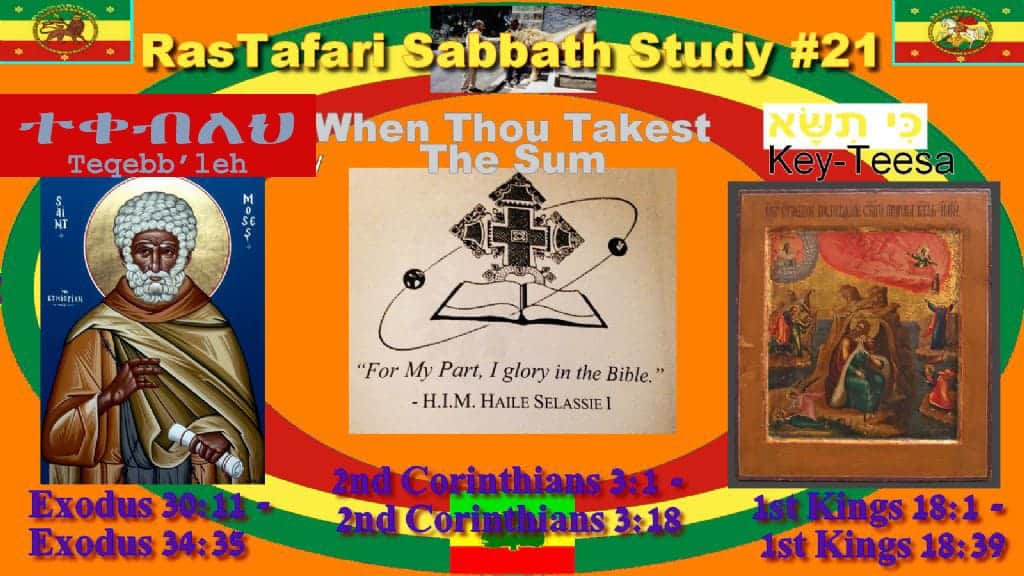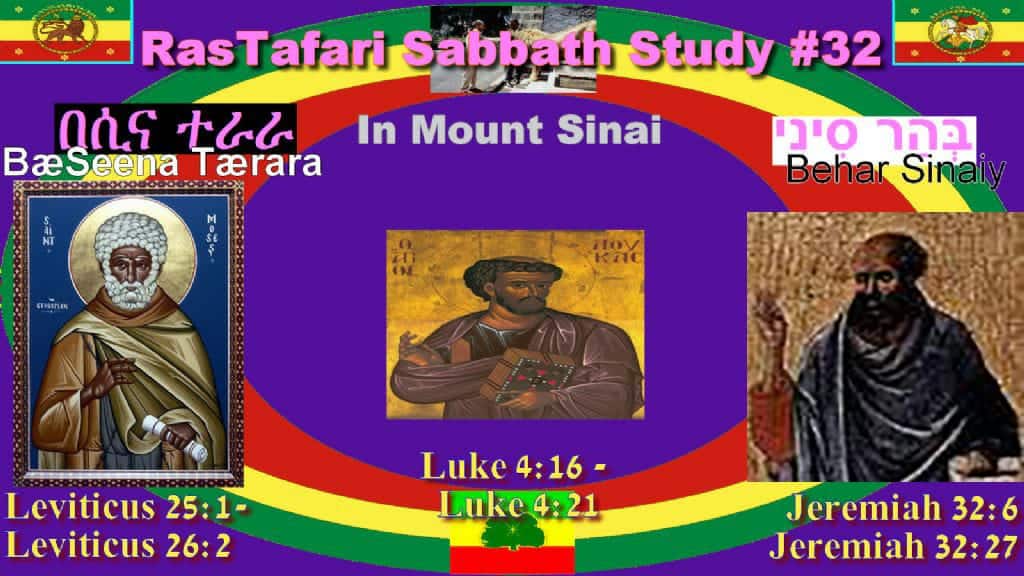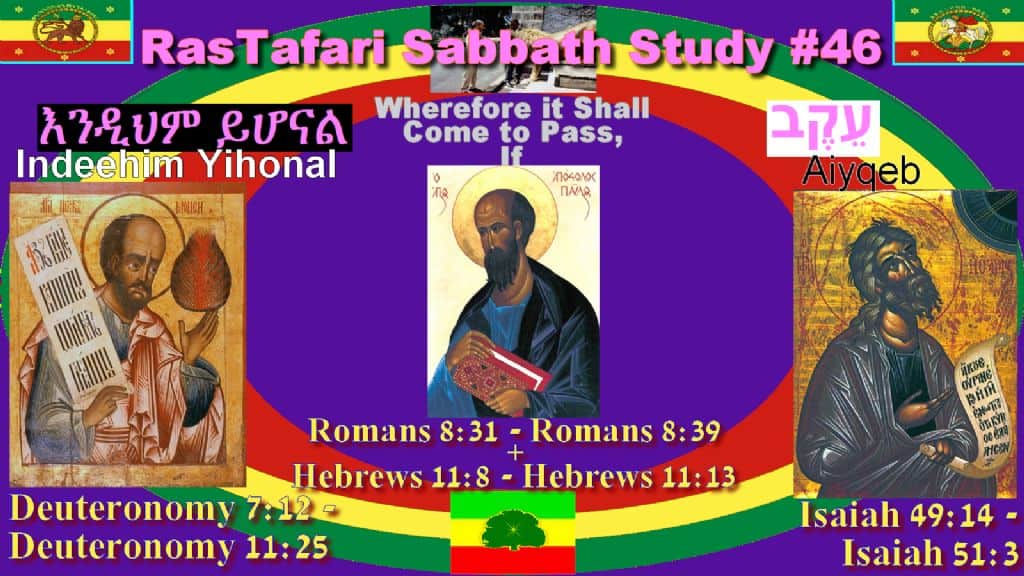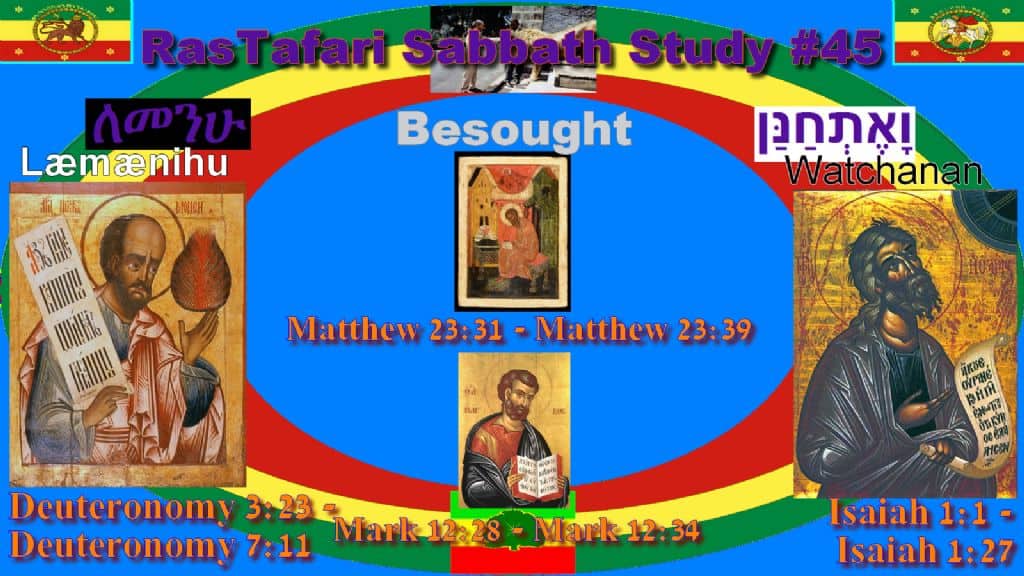This Week's Portion #29-30
Acharei Mot-Kedoshim | אחרי מות-קדושים | "After the death-Holy ones" ከሞቱ በኋላ-ቅዱሳን | keMotu beHwala-Q’dusan [Qiddusan]
*For a PDF version of All the Torah Portions Schedule, click here to download!
1. Torah Reading
Acharei Mot
- 1.1 First reading — Leviticus 16:1–17
- 1.2 Second reading — Leviticus 16:18–24
- 1.3 Third reading — Leviticus 16:25–34
- 1.4 Fourth reading — Leviticus 17:1–7
- 1.5 Fifth reading — Leviticus 17:8–18:5
- 1.6 Sixth reading — Leviticus 18:6–21
- 1.7 Seventh reading — Leviticus 18:22–30
Kedoshim
2. Prophets Reading
Ezekiel 22:1-19/Amos 9:7-15
3. New Testament Reading
Hebrews 9:11-28/1 Pet 1:13-16; 1 Cor 6:9-20
Portion Outline - TORAH
- Leviticus 16:1 | The Day of Atonement
- Leviticus 17:1 | The Slaughtering of Animals
- Leviticus 17:10 | Eating Blood Prohibited
- Leviticus 18:1 | Sexual Relations
- Leviticus 19:1 | Ritual and Moral Holiness
- Leviticus 20:1 | Penalties for Violations of Holiness
Portion Outline - PROPHETS
- Ezekiel 22:1 | The Bloody City
Portion Study Book Download & Summary
 VAYIKRA Hebrew Book of Leviticus - Torah Portion Vol.3 (FREE PDF)
VAYIKRA Hebrew Book of Leviticus - Torah Portion Vol.3 (FREE PDF)
Acharei Mot The twenty-ninth reading from the Torah and sixth reading from Leviticus is named Acharei Mot (אחרי מות), two words that mean “after the death.” The title comes from the first words of the first verse of the reading, which say, “Now the LORD spoke to Moses after the death of the two sons of Aaron” (Leviticus 16:1). Leviticus 16 describes the Tabernacle ceremony for the holy festival of the Day of Atonement. Leviticus 17 establishes general rules for sacrifice and sanctuary. Leviticus 18 lays down specific laws about permitted and forbidden sexual relationships.
Kedoshim The thirtieth reading from the Torah and seventh reading from Leviticus is named Kedoshim (קדושים), which mean “holy.” The title comes from the words in Leviticus 19:2, which says, “You shall be holy, for I the LORD your God am holy.” Leviticus 19 describes the holy community through a series of specific commandments. Leviticus 20 warns against the snares of sexual immorality and idolatry, mandating a death penalty for certain sins. Except in biblical leap years, Kedoshim is read on the same Sabbath as the previous reading, Acharei Mot.
Portion Commentary - Acharei Mot
A Personal Day of Atonement
Thought for the Week:
Passover this year comes immediately after Shabbat. This Shabbat's Torah reading is about the rituals of the Day of Atonement. The juxtaposition of Passover and the Day Atonement should remind us of Yeshua, our Passover lamb who died on Passover in order to work atonement for us in the heavenly Temple.
Commentary:
He shall make atonement for the holy place, because of the impurities of the sons of Israel and because of their transgressions in regard to all their sins; and thus he shall do for the tent of meeting which abides with them in the midst of their impurities. (Leviticus 16:16)
The rituals for Yom Kippur teach us about the distance between man and God. There is a deadly conceit in the heart of man. It is the idea that "I'm generally a pretty decent person. God isn't really that upset with my sin."
The Bible teaches that God cannot abide sin. All men are sinners, and therefore, all men are forced out of the presence of God. Just like Adam and Eve, who were forced out of the Garden of Eden, we are all separated from God.
Our sin is as filth before the Almighty. Shame and disgrace ought to cover us every time we open our Bibles. We have sullied the very parchment of Torah with our sins and trodden on the shed blood of Messiah. Our worthy deeds are utterly eclipsed by our transgressions and sins. Yom Kippur reminds us that this is a real problem. The writer of the book of Hebrews says that "in those sacrifices there is a reminder of sins year by year" (Hebrews 10:3).
The Day of Atonement reminds us that salvation and relationship with God cannot be attained by being good enough or scoring points with God. You cannot keep the Torah well enough. You can try keeping the commandments perfectly and working tirelessly for the kingdom and running from one good deed to the next, but in the final judgment, it will still be inadequate. The Day of Atonement teaches that we cannot be good enough to merit salvation, to win God's favor or to earn a reprieve from punishment. We have no worthy deeds before Him, and our sin is like uncleanness before Him. Sin forces us out of His presence. We cannot get past the veil to enter the Holy of Holies. "When the disciples heard this, they were very astonished and said, 'Then who can be saved?'" (Matthew 19:25).
Salvation and relationship with God depend on a person acknowledging that he cannot make the distance. A man needs atonement. He needs a sacrifice for purification.
On Yom Kippur, the high priest set out to cross the distance between us and God by entering the Holy of Holies. The book of Hebrews teaches that, in the heavenly Temple, the death and resurrection of Messiah was the equivalent of the high priest's entrance into the Holy of Holies on earth.
For Messiah did not enter a holy place made with hands, a mere copy of the true one, but into heaven itself, now to appear in the presence of God for us. ... He has been manifested to put away sin by the sacrifice of Himself. (Hebrews 9:24-26)
God has made a way of redemption for us through the death and resurrection of His righteous Son. For everyone who places faith in Him, there is redemption, salvation and the forgiveness of sins. This is the hope of our faith: the forgiveness of sins through faith in Yeshua. To experience this forgiveness, we need to have a saving relationship with God through Yeshua, His Son. We need to be born again.
Portion Commentary - Kedoshim
Holiness and Honesty
Thought for the Week:
What does a holy person look like? Do you picture a priest or a nun? Maybe a preacher? Perhaps you imagine a Chassidic Jew with a full beard, side locks and black hat. Leviticus 19-20 contains the Bible's description of what holiness looks like. The passage begins with the words, "Speak to all the congregation of the sons of Israel and say to them, 'You shall be holy, for I the LORD your God am holy'" (Leviticus 19:2).
Commentary:
One of the laws of holiness states, "You shall not steal, nor deal falsely, nor lie to one another" (Leviticus 19:11).
Have you ever been ripped off by a religious person? It's not surprising when we are cheated by people of the world. But it is disconcerting when a professing Christian or an observant Jew deceives or financially abuses us. We expect more from the religious person than a secular person. We assume that a religious person will conduct his affairs in concert with his moral values. That makes the religious person different from the secular person. That's what being holy is all about.
The Torah says that when a religious person conducts himself without integrity, he profanes the name of God. The word profane is the opposite of the word holy. Holy means "set apart." Profane means "common and ordinary." When a religious person conducts himself no differently than the common, ordinary people around him, he makes God look common and ordinary too. He damages God's reputation. An unbeliever who steals, deceives, lies, perjures and swindles is unremarkable, but when a believer acts that way, he disgraces the faith and gives opportunity for unbelievers to say, "You see? He is just like us. I knew there was no substance to his God or his religion."
The sages understood the commandment, "You shall not oppress your neighbor, nor rob him" (Leviticus 19:13) to be a prohibition against dishonest business transactions. As disciples of Yeshua obedient to God's Torah, we need to strive for scrupulous honesty, especially in matters of business.
Middot U, Mitzvot (Character and Deeds)
Grudges and Vengeance
You shall not take vengeance, nor bear any grudge against the sons of your people, but you shall love your neighbor as yourself; I am the LORD. (Leviticus 19:18)
Revenge is a privilege not bequeathed to the people of God. When someone wrongs us, we are not allowed to return evil with evil. This places us at a distinct disadvantage by the world's standards. What are we supposed to do when we are wronged? The Apostle Paul teaches that we are to overcome evil with good. We must return insults with kindness, curses with blessings. Paul says, "Never pay back evil for evil to anyone. ... If possible, so far as it depends on you, be at peace with all men" (Romans 12:17-18). This sounds like a recipe for injustice. It invites people to abuse us and take advantage of us. But Paul does not exclude vengeance and justice; he simply instructs us not to take it into our hands. If there is to be some sort of retribution, let it come from God. He says, "Never take your own revenge, beloved, but leave room for the wrath of God" (Romans 12:19).
This can be compared to two children fighting in the sandbox. The first child throws sand in the second child's face. The second child could return the gesture by throwing sand back, or he could wait for Mom to intervene. If he throws sand back, he has stooped to his sibling's level and loses the moral high ground. Both children are now sand-throwers; neither is better than the other. Moreover, both are liable for punishment. If the second child waits for justice to proceed from his mother, though, he retains the moral high ground and goes unpunished. His sibling will receive discipline that is probably more severe than the sand-in-the-face action. This is the approach Paul recommends.
If someone says something nasty about you, and you hear about it and respond by saying something nasty in return, you and the other person are both in the wrong. A better option is to take the moral high ground and leave the matter with the Almighty, who judges the universe in fairness. That is the path of real faith. When we take matters into our own hands, we betray a lack of faith. We feel we need to avenge ourselves because we don't trust God to work out the situation.
Paul does recommend a backward type of revenge. He says, "Do not be overcome by evil, but overcome evil with good" (Romans 12:21). We are overcome by evil when we return it. When we repay evil with evil, we become evil. Paul recommends repaying evil with good, and he quotes a proverb to demonstrate the efficacy of this approach:
If your enemy is hungry, give him food to eat; and if he is thirsty, give him water to drink; for you will heap burning coals on his head, and the LORD will reward you. (Proverbs 25:21-22)

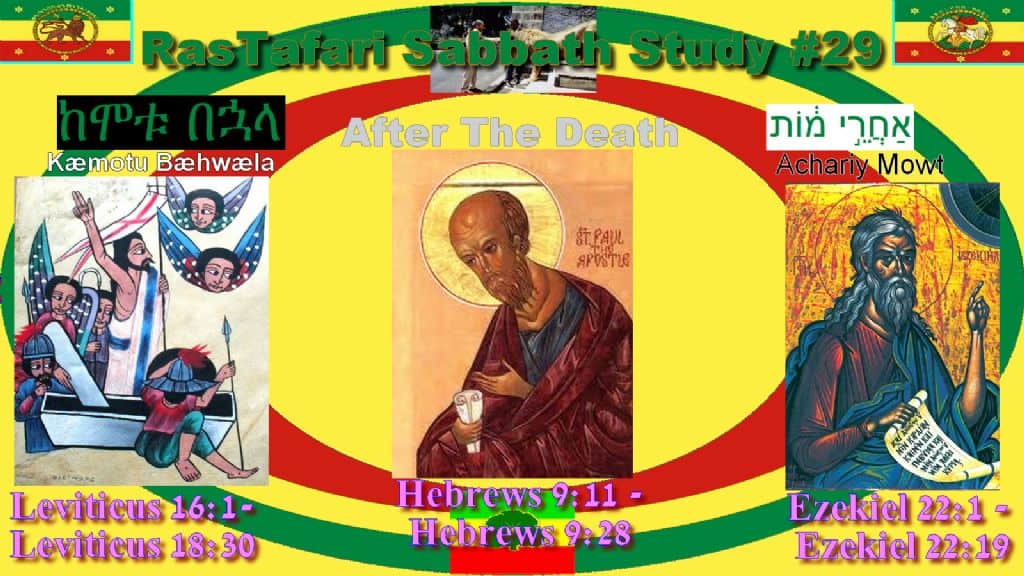



![RSS 30: Kedoshim | אחרי מות | Holy ones ቅዱሳን | Q’dusan [Qiddusan] RSS 30: Kedoshim | אחרי מות | Holy ones ቅዱሳን | Q’dusan [Qiddusan]](https://rastafarigroundation.org/wp-content/uploads/2019/03/Discipleship-Radi0-RasTafari-Bible-Readings-30_.jpg)
![RSS 30: Kedoshim | אחרי מות | Holy ones ቅዱሳን | Q’dusan [Qiddusan] RSS 30: Kedoshim | אחרי מות | Holy ones ቅዱሳን | Q’dusan [Qiddusan]](https://rastafarigroundation.org/wp-content/uploads/2019/03/Discipleship-Radi0-RasTafari-Bible-Readings-30_2_-1024x576.jpg)
![RSS 30: Kedoshim | אחרי מות | Holy ones ቅዱሳን | Q’dusan [Qiddusan] RSS 30: Kedoshim | אחרי מות | Holy ones ቅዱሳን | Q’dusan [Qiddusan]](https://rastafarigroundation.org/wp-content/uploads/2019/03/Discipleship-Radi0-RasTafari-Bible-Readings-30_2_1_.jpg)
![RSS 30: Kedoshim | אחרי מות | Holy ones ቅዱሳን | Q’dusan [Qiddusan] RSS 30: Kedoshim | אחרי מות | Holy ones ቅዱሳን | Q’dusan [Qiddusan]](https://rastafarigroundation.org/wp-content/uploads/2019/03/Discipleship-Radi0-RasTafari-Bible-Readings-30_2_1.jpg)
![RSS 30: Kedoshim | אחרי מות | Holy ones ቅዱሳን | Q’dusan [Qiddusan] RSS 30: Kedoshim | אחרי מות | Holy ones ቅዱሳን | Q’dusan [Qiddusan]](https://rastafarigroundation.org/wp-content/uploads/2019/03/Discipleship-Radi0-RasTafari-Bible-Readings-30_2.jpg)
